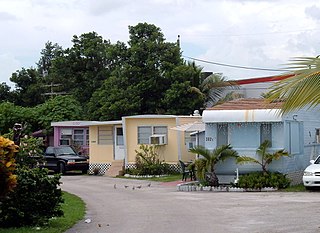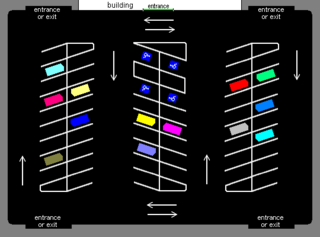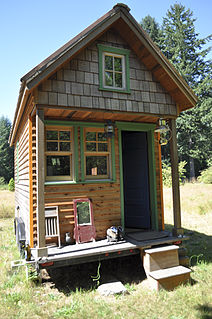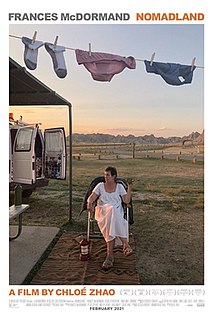
A trailer park or caravan park is a temporary or permanent area for mobile homes and travel trailers. Advantages include low cost compared to other housing, and quick and easy moving to a new area.

A recreational vehicle, often abbreviated as RV, is a motor vehicle or trailer which includes living quarters designed for accommodation. Types of RVs include motorhomes, campervans, coaches, caravans, fifth-wheel trailers, popup campers, and truck campers.

A caravan, travel trailer, camper, tourer or camper trailer is towed behind a road vehicle to provide a place to sleep which is more comfortable and protected than a tent. It provides the means for people to have their own home on a journey or a vacation, without relying on a motel or hotel, and enables them to stay in places where none is available. However, in some countries campers are restricted to designated sites for which fees are payable.

A parking lot or car park, also known as a car lot, is a cleared area intended for parking vehicles. The term usually refers to a dedicated area with a durable or semi-durable surface. In most countries where cars are the dominant mode of transportation, parking lots are a feature of every city and suburban area. Shopping malls, sports stadiums, megachurches and similar venues often have immense parking lots.

A campervan, sometimes referred to as a camper, caravanette, or motor caravan, is a self-propelled vehicle that provides both transport and sleeping accommodation. The term describes vans that have been fitted out, whereas a motorhome is one with a coachbuilt body.

A bookmobile or mobile library is a vehicle designed for use as a library. They have been known by many names throughout history, including traveling library, library wagon, book wagon, book truck, library-on-wheels, and book auto service. Bookmobiles expand the reach of traditional libraries by transporting books to potential readers, providing library services to people in otherwise underserved locations and/or circumstances. Bookmobile services and materials, may be customized for the locations and populations served.

Affordable housing is housing which is deemed affordable to those with a household income at or below the median as rated by the national government or a local government by a recognized housing affordability index. Most of the literature on affordable housing refers to mortgages and a number of forms that exist along a continuum – from emergency homeless shelters, to transitional housing, to non-market rental, to formal and informal rental, indigenous housing, and ending with affordable home ownership.
In law, no fixed abode or without fixed abode is not having a fixed geographical location as a residence, commonly referred to as no fixed address. This is applicable to several groups:

Housetruckers are individuals, families and groups who convert old trucks and school buses into mobile homes and live in them, preferring an unattached and transient lifestyle to more conventional housing. These vehicles began appearing around New Zealand during the mid-1970s and, even though there are fewer today, they continue to travel New Zealand roads.

Fulltiming is a term used among motorhome individuals and families who live "full-time" in their motorhome or RV. Such mobile individuals are often called fulltimers. Fulltiming is a worldwide activity, and there are many bloggers who record their day-to-day life on the road. The term has been discussed in publications since around 1993.

Homelessness is the condition of lacking stable, safe, and adequate housing. The definition of homelessness differs from country to country, with some countries yet to have any definition in place. People can be categorized as homeless if they are:

The tiny-house movement is an architectural and social movement that advocates for downsizing living spaces, simplifying, and essentially "living with less." According to the 2018 International Residential Code, Appendix Q Tiny Houses, a tiny house is a "dwelling unit with a maximum of 37 square metres of floor area, excluding lofts." While tiny housing primarily represents a return to simpler living, the movement was also regarded as a potential eco-friendly solution to the existing housing industry, as well as a feasible transitional option for individuals experiencing a lack of shelter.

Digital nomads are people who conduct their life in a nomadic manner while engaging in remote work using digital telecommunications technology. Such people generally have minimal material possessions and work remotely in temporary housing, hotels, cafes, public libraries, co-working spaces, or recreational vehicles, using Wi-Fi, smartphones or mobile hotspots to access the Internet. Some digital nomads are perpetual travelers, while others are only nomadic for a short period of time. While some nomads travel through various countries, others focus on one area. Some may engage in vandwelling. In 2020, a research study found that 10.9 million American workers described themselves as digital nomads, an increase of 49% from 2019.

Cycling infrastructure refers to all infrastructure permissible for use by cyclists, including the network of roads and streets used by motorists, except where cyclists are excluded, along with bikeways from which motor vehicles are excluded – including bike paths, bike lanes, cycle tracks, rail trails and, where permitted, sidewalks. Cycling infrastructure also includes amenities such as bike racks for parking, shelters, service centers and specialized traffic signs and signals. Cycling modal share is strongly associated with the size of local cycling infrastructure.

Chloé Zhao, born Zhao Ting, is a Chinese-born filmmaker, known primarily for her work on independent films. Zhao's debut feature film, Songs My Brothers Taught Me (2015), premiered at Sundance Film Festival to critical acclaim and earned a nomination for the Independent Spirit Award for Best First Feature. Her second feature film, The Rider (2017), was critically acclaimed and received nominations for the Independent Spirit Award for Best Film and Best Director.

Nomadland is a 2020 American drama film written, produced, edited and directed by Chloé Zhao. Based on the 2017 nonfiction book Nomadland: Surviving America in the Twenty-First Century by Jessica Bruder, it stars Frances McDormand as a widow who leaves to travel around the United States in her van as a nomad. David Strathairn also stars in a supporting role. A number of real-life nomads appear as fictionalized versions of themselves, including Linda May, Swankie and Bob Wells.

Nomadland: Surviving America in the Twenty-First Century is a 2017 nonfiction book by American journalist Jessica Bruder about the phenomenon of older Americans who, following the Great Recession from 2007 to 2009, adopted transient lifestyles traveling around the United States in search of seasonal work (vandwelling).

Housing in the United States includes both detached homes and apartment buildings. Housing is a vital economic sector, contributing to 15% of the GDP. For regional details, see also housing in the United States by state.

Bob Wells is an American vandweller, YouTuber, and author. He is noted for being an inspiration to thousands of people who embrace a minimalistic and nomadic lifestyle centered on vandwelling. Wells founded the Rubber Tramp Rendezvous, an annual gathering of vandwellers in Quartzsite, Arizona, and the Homes on Wheels Alliance, a charity organization that assists needy individuals in acquiring vehicles for habitation and travel.
In August 2021, Gabby Petito, an American woman, was killed by her fiancé, Brian Laundrie, while traveling on a vanlife journey across the United States together. The trip began on July 2, 2021, and was planned to last four months; however, Petito disappeared in late August.


















